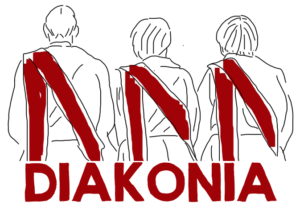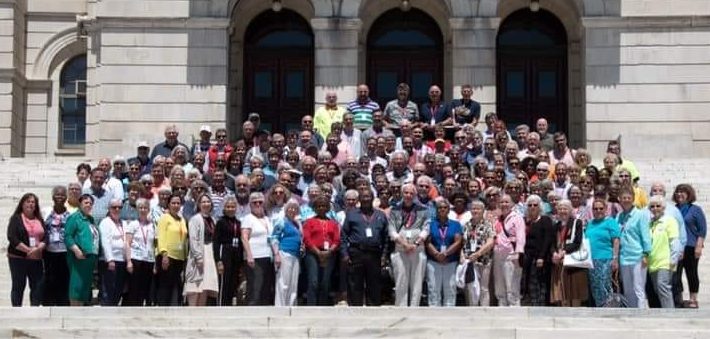
This is part seven of a series on the diaconate we’re calling Diakonia looking at the amazing variety of voices within the ministry of deacons by diaconal candidate Dani Gabriel
In this installment, Dani interviews The Rev. Liz Margarita Hernandez Martinez and The Rev. Leticia Guevara-Cuence
Previous Series Installments
Part 1: Living with Jesus
Part 2: Interview with Bishop Curry
Part 3: Stephen, the bicycle deacon
Part 4: The Venerable Canon Nina Pickerrell
Part 5: Jess, the Bridge Builder
Part 6: The Rev Tracie Middleton
Every three years the Association for Episcopal Deacons (AED) hosts a Triennial. The “AED is a membership-funded association of persons and dioceses within The Episcopal Church whose mission is to increase participation and involvement of all baptized persons in Christ’s diaconal ministry, especially by promoting and supporting the diaconate.”

The Triennial is an amazing opportunity for deacons and supporters from all over the Episcopal Church to meet and learn together. I attended the 2019 Triennial in Rhode Island. At the Triennial I met dozens of inspiring deacons. Leticia (Letty) serves as deacon at Christ Church Episcopal, Norcross, GA. Liz serves as the only deacon in the diocese of Cuba. Together they told me stories that re-inspired me and reminded me why I want to be a deacon. I was able to find a quiet corner of the hotel, in between workshops and services, and steal a few minutes to interview them. Letty translated for Liz and I.
Dani: What is it like being the only Deacon in Cuba?
Letty translating for Liz:
She said it’s very hard to be the only one for the last 11 years. And it’s a little bit frustrating at the same time, because she cannot share her challenge, her frustrations, her concerns with anybody else, because everybody who’s trying to be a Deacon in the island, is because they’re going to be a priest. So, nobody’s quite interested to know what the ministry of the diaconate means, what the challenges [are]… She would like to have somebody, another Deacon so they can share experiences, somebody who shares the same reality she is living now. Unfortunately, no. She said that all women and men are called to receive some kind of ministry. We are universally priests based on our baptismal covenant. But nobody wants to take the challenge of trying to be a vocational Deacon in Cuba…Unfortunately up to now, that was impossible.
Dani: So, what drew you to the diaconate?
Letty translating for Liz:
So, she said that the reason why she decided to be a Deacon is because she wants to be in contact with the people directly. For a priest, it’s more the administrative and political issues that keep [them] away from direct contact with the people. She wants to walk in the street with the people, who need her spiritually and even materially, as much as she can. Cuba… is a country with a lot of deficiencies. And it’s a fertile ground for a Deacon.
Dani: What is your main ministry and what does that have to do with the politics in Cuba today?
Letty translating for Liz:
She is working as the secretary of the national convention in the island. She also is a researcher for the Evangelical Seminary in Matanzas and also she is a minister in a church. That’s where she developed her job with the people, helping the community in Matanzas [with whatever] they need.
Dani: So, what kind of things?
Letty translating for Liz:
She works mostly with people who have health issues. It’s a rural church with people with a very low income. They are very poor. And she does pastoral care with most of the people, trying to reach out [and find out] what their needs are and, along with the rector of her church, they’re trying to find the resources to handle all those…specific cases.
Dani: And what is it like for the church in Cuba with the political situation in Cuba?
Letty translating for Liz:
She said that they have a good relationship. The Episcopal Church in Cuba is a church that wants to walk along with the people. Along with the needy, the marginalized, the people who are separated for different reasons. The Cuban government lately has relaxed its restrictions on the church.
The first Episcopal Church established in Cuba was in 1883. No other religion was established in Cuba before that time, except the Roman Catholic Church. And the first church was founded exactly in her town, Matanzas. And now there is a monument, a national monument on the island. [That] gave us the chance to be the second largest religious community in the island. Many people are Roman Catholic, but after that, most of the Cubans are Episcopalian.
Dani: I did not know that. What is your hope for the diaconate in Cuba?
Letty translating for Liz:
She said that her hope is help [get] more vocational deacons in Cuba. Of course, because she said that the diaconate and the work of the Deacon has to be visible to the world. The church cannot take care only of the spirit, but also of the Body of Christ. And the Body of Christ, you’re talking about the physical body. And she means the marginalized, the excluded, the poor, the needy, the sick. All these people have real needs and these needs have to be fulfilled, and that’s where Deacons need to be there to help. To take care of the whole Body of Christ, spiritually and materially.
For her the diaconate is important, because she refers to Mark’s Gospel, chapter 10, verse 45 when Jesus said The Son of the Man didn’t come to be served but to serve. The whole Gospel shows that the mission of Jesus in the world was to be a Deacon, to serve others. So, she said that the diaconate is crucial in the formation of the Body of Christ, the community of Christians that Jesus commanded to be expanded all over the world.
The diaconate marks the values of the Word for a new [world]. So, it’s absolutely a key point. A breakpoint between the spiritual and the material is important to create a new kingdom with the values of the diaconate.
Dani: What else should we know about your work in Cuba?
Letty translating for Liz:
Besides her job as a missioner in the church and as a secretary of formation in the diocese and her historical research activity in the Seminary, she also has a very close relationship with the Bishop. And she thinks it is important because as a Deacon, she has the chance to give her a vision of what’s going on [outside], because sometimes…nobody tells the Bishop what’s going on outside.
Dani: What is your relationship and your diocese relationship to the Episcopal Church in Cuba?
Letty: Atlanta has a very close relationship with the diocese of Cuba. The relationship between the Diocese of Atlanta with the Diocese of Cuba comes from 1904. So, this is not something new. The first Bishop in the Diocese of Cuba in 1904 was the Dean of the Cathedral of St. Philip in Atlanta.
Dani: So, what is your primary ministry?
Letty: My primary ministry is immigration. I’m trying to help the Hispanic [community]. We have growing Hispanic communities in several churches in the Dioceses of Atlanta. We actually have right now…eleven Hispanic congregations in Atlanta. Bishop Wright is working to make this number grow as much as possible.
My church has a Hispanic congregation, which has a lot of needs. And I am trying to be an advocate along with the Archdeacon Juan Sandoval to work in the Sanctuary Movement…we are especially, especially preoccupied about the people with DACA. We have a lot of recipients in Atlanta that need our support…They came here because their parents brought them and now this is their country. Many of them are trying to develop a career in colleges and universities. And they want to have a job. They want to have a family. And all these dreams.
My best friend came here when her son was three years old. If you send him now, he’s 22. If you send him back to Venezuela, he’s going to a strange country. He doesn’t know Venezuela. What’s he going to find out there? Nothing. So, it’s a reality. Okay? And penalizing and punishing these people is not a solution.
I also work with Dr. Catherine Meeks…and the Absalom Jones Racial Healing Center. I’m helping to develop a curriculum, to develop a training that we can use in the Hispanic community.
Dani: What drew you to the diaconate?
Letty: I [started to work with] Fabio Sotelo. He’s from Columbia. He’s a former Roman Catholic priest. And one day he called me and said, “Would you like to be a priest?” And I thought for five seconds and I said, “No, Father. I think I would like to be a Deacon.” And then we were in the process to call another rector to my church. And I spoke with the interim rector and she told me, “I can help you with anything you want. You want to be a priest? I will support you to be a priest.” I said, “No. I have it clear. I don’t want a job. I want a ministry. I want to be a Deacon.” So, she was my sponsor and that’s when the process started.
I don’t want to spend time dealing with the budget and those kinds of things, and fighting with the Diocese, or going to this meeting and this other meeting. I saw my rector and I said, “I don’t like that job.” And she looked at me and said, “I don’t like it either.” I like to sit down in the parish hall and talk to the people.
Dani: So, for both of you, what is your hope for the relationship between the church in the United States and the church in Cuba, and the relationship between Deacons in the United States and Deacons in Cuba?
Letty translating for Liz:
Okay. She said that Cuba was always part of the Episcopal Church in the United States until 1966 when they received autonomy..based on the political situation on the island. And now, they are part of the Episcopal Church of the United States again, [since] last General Convention. So, she thinks we can do a lot of things together.
Yesterday we…actually met a group of Deacons who work with Hispanic communities here in the United States and we are trying to work and develop some kind of resources…to engage more vocations. And I think for her, it’s important that we work together, so the Episcopal Church in the United States can help the Diocese of Cuba to find resources, to engage the people and…find more vocations.
Dani Gabriel is a poet, writer, and teacher. Dani is a Candidate for the Diaconate in the Episcopal Diocese of California, aspiring to ordination and service in the church and community. Dani is the current Poet Laureate of El Cerrito, CA. Learn more about their work at www.allthepossible.com.
Main image: Gathering of Deacons from AED, episcopldeacons.org

